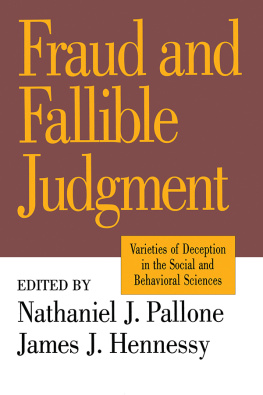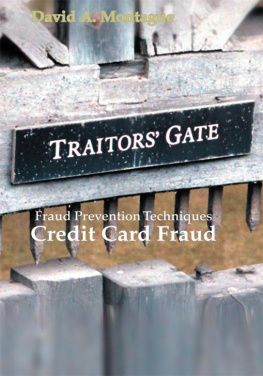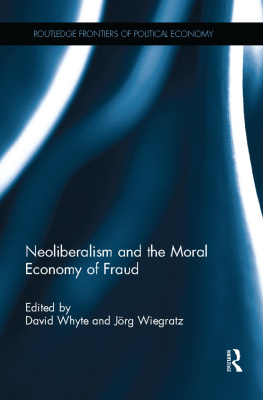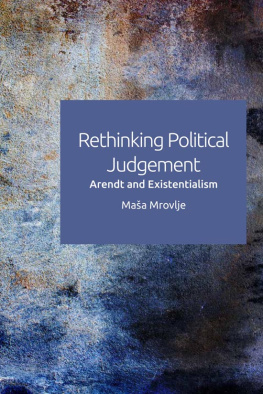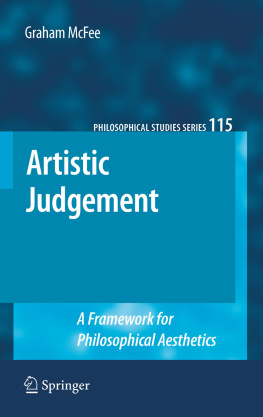Fraud and
Fallible
Judgment
Fraud and
Fallible
Judgment
Varieties of Deception in the
Social and Behavioral Sciences
EDITED BY
Nathaniel J. Pallone
James J. Hennessy
First published 1995 by Transaction Publishers
Published 2017 by Routledge
2 Park Square, Milton Park, Abingdon, Oxon, 0X14 4RN
711 Third Avenue, New York, NY 10017, USA
Routledge is an imprint of the Taylor & Francis Group, an informa business
Copyright 1995 by Taylor & Francis.
The preface and originally appeared in Society 30:3 in 1993.
All rights reserved. No part of this book may be reprinted or reproduced or utilised in any form or by any electronic, mechanical, or other means, now known or hereafter invented, including photocopying and recording, or in any information storage or retrieval system, without permission in writing from the publishers.
Notice:
Product or corporate names may be trademarks or registered trademarks, and are used only for identification and explanation without intent to infringe.
Library of Congress Catalog Number: 94-46395
Library of Congress Cataloging-in-Publication Data
Fraud and fallible judgment : varieties of deception in the social and behavioral
sciences / edited by Nathaniel J. Pallone and James J. Hennessy.
p. cm.
Includes bibliographical references (p. ) and index.
ISBN 1-56000-813-X (pbk.: alk. paper)
1. Social sciencesResearchMoral and ethical aspects. 2. Social
scientistsProfessional ethics. 3. Fraud in science. I. Pallone, Nathaniel J.
II. Hennessy, James.
H62.F698 1995
305.9309dc20
94-46395
CIP
ISBN 13: 978-1-56000-813-2 (pbk)
Contents
Irving Louis Horowitz
NathanielJ. Pallone and James J. Hennessy
Part I: Deception: Its Varieties and Its Engines
Nathaniel J. Pallone and James J. Hennessy
David Goodstein
Marcel C. LaFollette
Neil Gilbert
Del Thiessen and Robert K. Young
Mary Lefkowitz
James S. Coleman
Linda S. Gottfredson
Richard Ofshe and Ethan Waiters
Edith Kurzweil
Robert B. Joynson
J.
Philippe Rushton
Nathaniel J. Pallone and James J. Hennessy
In the wonderful short story When Greek Meets Greekconcerning a mutual scam between donors and recipients of degrees at the nonexistent St. Ambrose College of OxfordGraham Greene, the most flinty of English writers, allows himself a conclusion of his own. There were bigger frauds all round them; officials of the Ministries passed carrying little portfolios; controllers of this and that purred by in motorcars, and men with the big blank faces of advertisement hoardings strode purposefully in khaki with scarlet tabs down Park Lane from the Dorchester. Their fraud was a small one by the world's standard? and a harmless one: the boy from Borstal and the girl from nowhere at all.
One can imagine that readers would react similarly to this issue of fraud in the social sciences. After all, when compared to the implications of cancer research or solutions to age-old mathematical puzzles, the problems posed by social science research pale in significance. Still, even there, especially when the issues dwelled upon are intelligence quotients and tests, risks of drug use to the urban population, or racial differentials in criminal behavior, the policy consequences are sufficiently weighty to cause a worldly concern about fraudulence. In essence, it is less a matter of fraud than of the nature of truth in social relations and experiential rules. Dealing with epistemology as a problem of social science permits the absorption of philosophy in small dosesbut at this point, any dose will do.
The issue of fraudas several contributors make quite clearmoves far beyond a simple dictionary definition of duplicity. The social sciences hardly provide an area where painting spots on mice to prove an oncological point can be replicated. Rather, social scientists are faced with a full range of optionsfrom plagiarizing of data and ideas to quiet suppression of information that might cause harm or injury to a group the researcher feels has already been sufficiently harmed or injured in the past. Whatever its nature, the word fraud itself carries a terrible sting. Allegations of this sort can be usedand in the case of the British psychologist Cyril Burt were usedto destroy careers and control dangerous thoughts.
Fraud is also of concern to the internal life of a disciplineraising issues from self-policing to academic policy. Reputations are built on discovery, they are destroyed through aspersions of fraud. Much of this takes place in the nether world of professional societies, having next to nothing to do with larger public concerns. This volume, therefore, is concerned with the double life of social science: fraud and its impact on public confidence in and respect for the views and opinions of social scientists, as well as the way charges and counter-charges embroil the professional life of social scientists with the intimacies of their everyday private lives.
Irving Louis Horowitz
This volume had its origins in a focused issue of Society (volume 31, no. 3, 1994) which had as its theme fraud in research. Papers originally published in that issue have been joined by two prepared especially for this volume and others which first appeared in print elsewhere. Without the efforts of Irving Louis Horowitz, Howard Schneiderman, Brigitte Goldstein, and other members of the editorial staff of Society, this volume could not have come into being.
We are grateful to the editors of the American Scholar and to the United Chapters of Phi Beta Kappa, its publisher, for permission to reprint David Goodsteins paper in this volume, which originally appeared under the title Scientific Fraud (volume 60, no. 4,1991, pp. 50515); and to the editors of Academic Questions and Transaction Publishers for permission to reprint James S. Colemans paper, which originally appeared under the title On the Self-Suppression of Academic Freedom (volume 4, no. 4,199091, pp. 1722). Finally, we express our continuing gratitude to Eric Workowski of the Graduate School of Criminal Justice at Rutgers, who provided research assistance in a variety of areas for this project.
Nathaniel J. Pallone and James J. Hennessy
Deception:
Its Varieties and Its Engines
1
Deception, Fraud, and Fallible Judgment
Nathaniel J. Pallone and James J. Hennessy
This volume concerns itself with deception in the social and behavioral sciences and with social science perspectives on conditions that elicit deceptive behavior among scientists, whatever their discipline. As David Goodstein forcefully demonstrates in his chapter, the myth of the noble scientist has been severely challenged (or perhaps laid to rest), both in this country and abroad, in the wake of widespread public awareness of malfeasance among sometimes highly visible members of the scientific community. Episodes of misconduct in research once resolved or handled


